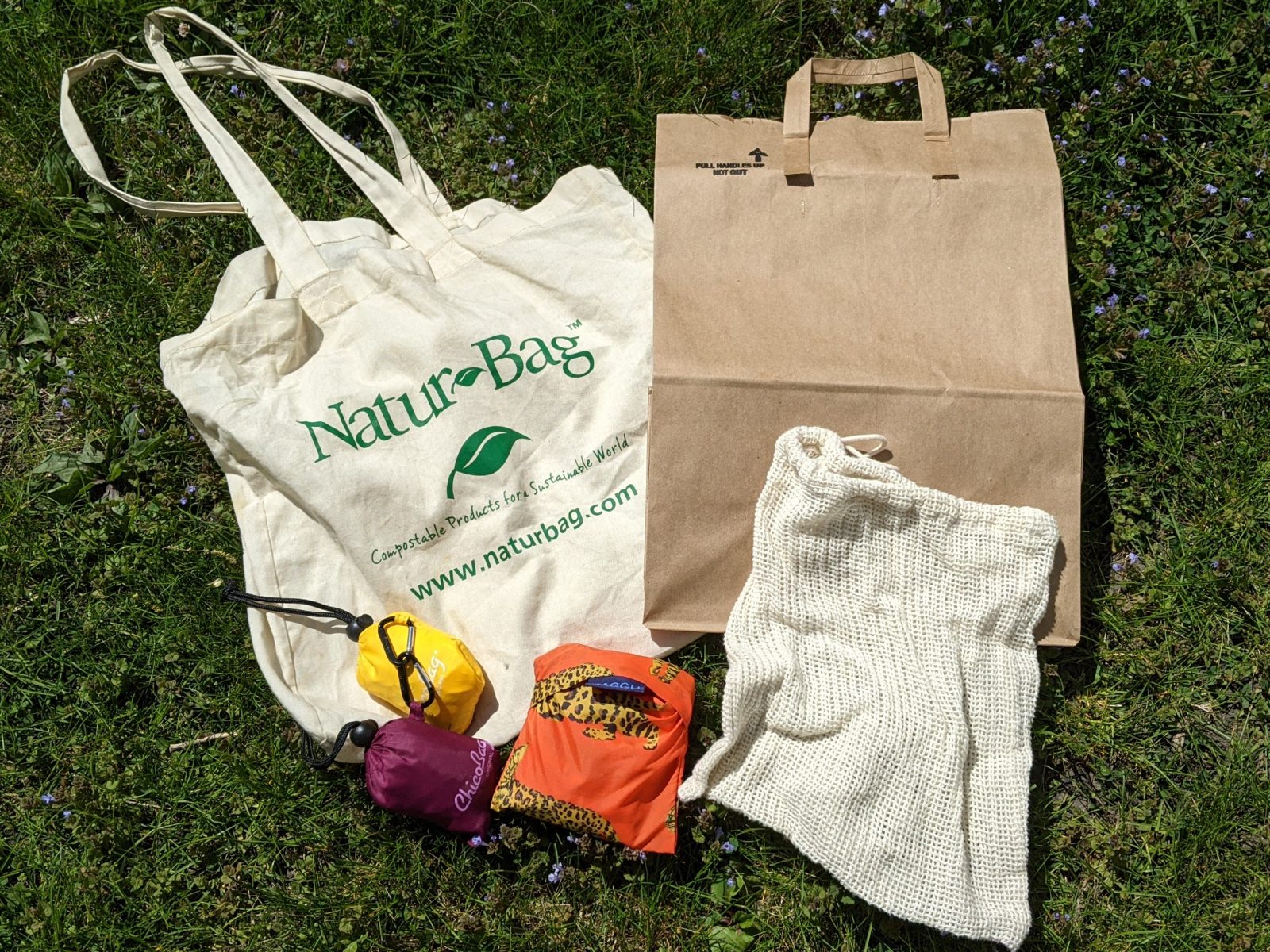Sustainable Shopping Bags —Which Bag Is Best?
Though you may have heard reusable bags are always best, recent studies show a much more complicated picture.
Grocery Shopping Bags
There are several different choices in bags for you to use at the grocery store. Each has its own benefits and drawbacks. Cotton bags such as the ones in this photo are biodegradable. However, they cost much more energy to make than traditional plastic bags, which can be damaging to the environment.
There are several different choices in bags for you to use at the grocery store. Each has its own benefits and drawbacks. Cotton bags such as the ones in this photo are biodegradable. However, they cost much more energy to make than traditional plastic bags, which can be damaging to the environment.
Are paper or reusable shopping bags much better for the environment?
Americans go through hundreds of billions of plastic bags each year. In an effort to curb the number of bags being used once and then thrown away, cities around the world have instituted bans or taxes on plastic bags. But are paper or reusable bags much better for the environment? Science shows that there is no clear answer.
Plastic Shopping Bags
A major advantage of plastic bags is that, when compared to other types of shopping bags, producing them carries the lowest environmental toll. The thin, plastic grocery store bags are most commonly made from high-density polyethylene (HDPE). Although the production of these bags does use resources like petroleum, it results in fewer carbon emissions, waste, and harmful byproducts than cotton or paper bag production. Plastic bags are also relatively sturdy and reusable.
Many of the studies about different bagging options that show plastic bag production demand fewer resources assume plastic bags are used at least twice—once coming home and once as a trash bag—and factor this into the calculations about which bags are more sustainable.Plastic bags are recyclable, though few people recycle them. Recycling plastic bags is a difficult task; they fly away in the recycling plant and get stuck in machinery. Because of this, many cities do not offer curbside recycling for plastic bags. Instead, large-scale retailers offer bag recycling services. However, these services are dependent on the consumer bringing the plastic bags back to the store.
Bags that are not recycled end up becoming litter, because they do not biodegrade. In addition to filling up landfills and becoming eyesores, plastic bags that become litter endanger many facets of the environment, including marine life and the food chain. This is because plastic bags, like all plastic materials, eventually break up into microscopic pieces, which scientists refer to as microplastics. Microplastics have been found nearly everywhere: in marine animals, farmland soil, and urban air.
Though scientists have only just begun studying the consequences of microplastic proliferation, and we do not yet know their effect on animals, humans, and the environment, scientists are concerned about how this level of plastic pollution could change our planet. The studies that found plastic bags to be less harmful to the environment than paper and reusable bags did not take the effects of litter into account and instead assumed that the plastic bags would be recycled or used as trash bags.
Paper Shopping Bags
Paper bags have some advantages over plastic bags when it comes to sustainability. They are easier to recycle, and, because they are biodegradable, they can be used for purposes like composting. However, paper is very resource-heavy to produce: Manufacturing a paper bag takes about four times as much energy as it takes to produce a plastic bag, plus the chemicals and fertilizers used in producing paper bags create additional harm to the environment.
Studies have shown that, for a paper bag to neutralize its environmental impact compared to plastic, it would have to be used anywhere from three to 43 times. Since paper bags are the least durable of all the bagging options, it is unlikely that a person would get enough use out of any one bag to even out the environmental impact.
Still, the fact that paper is recyclable helps lessen its impact. In 2018, 68.1 percent of paper consumed in the United States was recovered for recycling, a percentage that has been rising in the last decade. However, because paper fibers become shorter and weaker each time the recycling process takes place, there is a limit to how many times paper can be recycled.
Reusable Shopping Bags
Reusable bags are made from many different materials, and the environmental impact of producing those materials varies widely. One study from the United Kingdom (U.K.) found that, regarding bag production, cotton bags have to be reused 131 times before they reduce their impact on climate change to the same extent as plastic bags. To have a comparable environmental footprint (which encompasses climate change as well as other environmental effects) to plastic bags, a cotton bag potentially has to be used thousands of times. Materials other than cotton, however, perform much better in sustainability metrics. Nonwoven polypropylene (PP) is another popular option. Made from a more durable kind of plastic, these bags need to be reused around eleven times to break even with the impact of conventional plastic.
In addition to varying widely in their eco-friendliness, there is the chance that reusable bags go unused because consumers have to remember to bring the bags with them to the store. The biggest positive of reusable bags is that their use cuts down on the amount of litter on land and in the ocean. Studies have found that bans on plastic bags in cities in the United States and Europe have decreased the amount of plastic litter in nearby waters.
Reusable and Paper Shopping Bags to Consider
Because reusable and paper bags have a huge environmental cost upfront, and plastic bags create greater negative effects after being used, it is hard to determine which type of bag is truly the most sustainable. Regardless of whether the bag is plastic, paper, or another material, the most sustainable choice is the bag you already have. In every study and for every type of bag, it was clear that reusing the bag as many times as you can reduces its impact on the environment. Overall, making the effort to reuse any bag that comes into your possession, and disposing of the bag responsibly, is key.
TLPPACKAGING FOR SHOPPING BAGS





